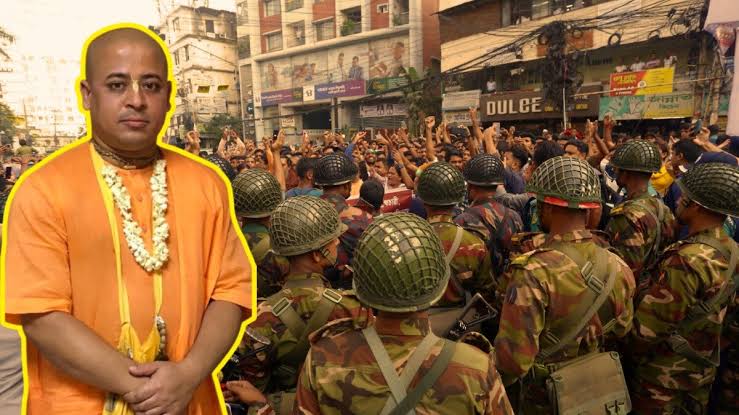Sedition case filed against ISKCON leaders in Bangladesh, two Hindu activists arrested — India must take Note and prepare for Action

Chittagong Metropolitan Police (CMP) in Bangladesh detained two young Hindu rights activists, Rajesh Chowdhury (18), and Hriday Dash (25), for allegedly disrespecting Bangladesh’s national flag.
The incident occurred on October 25, 2024, when these individuals, along with others, reportedly raised a Hindutva “Ocher Flag” above the national flag at the Swadhinata Stambha (Independence Pillar) at the New Market intersection in Chittagong.
This action has stirred intense public debate, legal proceedings, and widespread condemnation across social media and various communities in Bangladesh.
Authorities have filed a sedition case against 19 individuals, including Rajesh and Hriday Dash, who are accused numbers 18 and 19 in the case, as well as the primary suspect, Chinmoy Krishna Das Brahmachari, the organizing secretary of ISKCON (International Society for Krishna Consciousness) in Chittagong.
The event that sparked this controversy was a demonstration organized on October 25 at Laldighi Maidan in Chittagong to support the Sanatan community’s demands.
Thousands of people, including members of the Bangladesh Sanatan Jagran Manch, had gathered for the rally.
Following the event, a group marched to the New Market intersection, where the Independence Pillar stands as a symbol of Bangladesh’s sovereignty, and raised the ocher flag associated with Hindutva above the national flag of Bangladesh.
The police allege that this act aimed to express disdain toward the nation’s sovereignty, thereby undermining its integrity and sparking public outrage.
Firoz Khan (Mobile-01819 385273), a resident and the complainant in this case, filed the sedition complaint on October 31 at Kotwali police station.
In his statement, Khan asserts that the hoisting of the Hindutva flag, orchestrated by ISKCON’s local leaders, was a deliberate attempt to provoke division and chaos, symbolically challenging the country’s unity and values.
He claims the accused, including organizers and supporters of the Sanatan movement, have violated Bangladesh’s National Flag Rules of 1972 (Amended in 2010), which mandate that no other flag may be raised higher than the national flag.
The incident, he suggests, incited “class enmity” and stirred resentment within the general public, thus constituting sedition under Bangladesh’s legal framework.
The 19 defendants listed in the sedition case include prominent figures and supporters associated with ISKCON and the Sanatan movement, with Chinmoy Krishna Das Brahmachari listed as the primary accused.
The case details that this organized act sought to denigrate Bangladesh’s national identity by attempting to assert a religious identity above the sovereign state.
Firoz Khan notes that he gathered information on the accused through local sources and social media, which later prompted him to officially file the complaint.
Those charged face allegations of engaging in “criminal conspiracy” to undermine national unity, stirring societal division, and violating the integrity of the national flag.
The police are also investigating whether this act was premeditated, with possible political or sectarian motivations, as these actions align closely with other recent calls for Sanatan community rights.
Ajay Dutt, Leela Raj Das Brahmachari, Gopal Das Tipu, Dr. Kathak Das, Engineer Amit Dhar, Roni Das, Rajeev Das, Krishna Kumar Dutt, Ziku Chowdhury, Newton de Bobby, Tushar Chakraborty Rajiv, Mithun Dey, Rupan Dhar, Rimon Dutt, Sukant Das, Biswajit Gupta, Rajeev Chowdhury, and Hriday Das are among the other defendants in the case in addition to Prabhu Chinmoy Krishna Das.
In response to the incident, ISKCON’s Chinmoy Krishna Das Brahmachari has defended the actions taken during the rally, distancing the movement from any anti-national intent.
He argues that the rally was organized purely to advocate for the Sanatan community’s rights in Bangladesh, emphasizing that ISKCON has no stance against the government or the state itself.
Addressing the attendees during the rally, he stated that the event aimed to raise awareness about the rights and demands of Sanatan followers, emphasizing peace and respect for the nation.
Das further urged his followers to continue fighting for these rights peacefully, even if he were detained or faced consequences as a result.
In Bangladesh, desecration of the national flag is considered a serious offense, as the flag represents the struggles and sacrifices made for independence and sovereignty.
The National Flag Rules explicitly prohibit any flag, symbol, or object from being displayed above the national flag, and breaching these rules can be grounds for charges like sedition, which is punishable by both imprisonment and fines under Bangladeshi law.
Public outcry following the incident has highlighted broader issues concerning national identity, freedom of expression, and religious rights.
Social media platforms became a battleground for opinions on the matter, with citizens expressing disapproval and anger toward the display of the ocher flag over the national flag.
For many Bangladeshis, this incident appears to disregard the sanctity of the national flag and the values it symbolizes, leading to greater social and religious tensions within the community.
The incident also brings attention to the grievances of the Sanatan community in Bangladesh, which has been vocal about issues like discrimination, religious rights, and protection from violence.
The October 25 rally was organized as part of a larger movement to address perceived injustices faced by the Sanatan community, which they claim have worsened over time.
Sanatan leaders argue that despite being peaceful and law-abiding, they face significant challenges in practicing their faith and require stronger legal and social protections.
ISKCON has positioned itself as an advocate for the Sanatan community, urging the government to consider their demands, which include safeguarding religious rights and addressing issues of discrimination.
However, acts like the flag hoisting incident complicate these advocacy efforts, as they can be perceived as disrespectful or antagonistic, potentially harming the cause rather than advancing it.
The incident at Chittagong’s Independence Pillar underscores the delicate balance Bangladesh must maintain between protecting its national symbols and accommodating the rights of its diverse religious communities.
While freedom of expression and the right to religious assembly are constitutionally protected in Bangladesh, actions perceived as challenges to national sovereignty are treated with strict legal scrutiny, as demonstrated by the arrests and the sedition case against ISKCON members.
The controversy serves as a reminder of the need for religious groups and government authorities to engage in open dialogue, preventing the escalation of tensions that may arise from misinterpreted or provocative actions.
As the legal process unfolds, it will likely set a precedent on how national symbols are protected and how religious and social groups advocate for their rights within the framework of Bangladeshi law.
For now, the Chittagong flag incident remains a contentious point, sparking debate over patriotism, the rule of law, and religious identity in Bangladesh.




